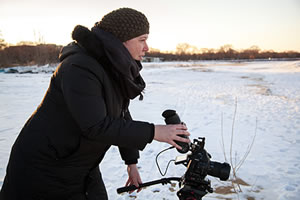We’ve designed our MFA around ten core courses, which explore a diverse array of concepts and techniques involved in documentary film and media making, while simultaneously supporting each students’ artistic growth.
Students will build a significant portfolio of work during the program: in the first year, they will create at least one short film, and begin preproduction on their thesis project. The second year focuses on the production and completion of the thesis project (10-20 minutes in length) that can be developed as a documentary, hybrid, or interactive project. Throughout the two year program, students are encouraged to continue making additional work in classes where possible.
In addition to learning about the art and craft of media production, students learn about the business of filmmaking, including pitching, fundraising, budgeting, distribution, and exhibition.
Core courses are augmented with electives, such as animation, advanced cinematography, advanced editing, interactive media, post-production sound, curatorial practices, and writing for documentary.
| Core courses (10) | |
|---|---|
| RTVF 457 – Art of the Real A documentary history/theory course taught annually. | 1 |
| RTVF 550 – Documentary Practices Taught annually in Winter, this course will offer rotating topics to expand students’ understanding of practical techniques in documentary practice. | 2 |
| RTVF 551 – Documentary Techniques This core course combines practice and theory to introduce students to nonfiction filmmaking through the process of directing their own short 6 to 8 minute project. With equal emphasis placed on technical training and creative development, students will gain hands-on experience in cinematography, sound recording, and editing. (Taught every other year in Fall) | 1 |
| RTVF 552 – Narrative Techniques Intro to small-crew narrative sync-sound filmmaking; hybridization: narratives that use doc techniques, docs that use narrative techniques. Product: short narrative film. (Taught every other year in Fall) | 1 |
| RTVF 553 – Pre-Thesis First year MFA in Documentary Media students develop a proposal and accompanying materials for their thesis project, which they will direct and complete during their second year of study. | 1 |
| RTVF 554 – Thesis 1 Development and production of thesis project. Refined proposal and principal photography completed by the end of the quarter. | 1 |
| RTVF 555 – Thesis 2 Post-production of thesis project. Rough-cut or prototype of interactive project completed by the end of the quarter. | 1 |
| RTVF 556 – Thesis 3 Final post-production steps for thesis project, including polished cut, sound mix, color correction. Students are expected to curate and organize a public screening/exhibition of their thesis projects. | 1 |
| RTVF 557 – Elements of Sound and Image Taught annually in the Fall, this course introduces students to numerous production and post-production techniques, including introductions to cinematography, sound and post-production. | 1 |
| Topics courses (3) RTVF (300 level or higher) with director of MFA approval | |
Sample courses include: 16mm Filmmaking Expanded Techniques (1) One of these 3 electives needs to fulfill the one course Expanded Techniques requirement, which invites students to expand their practice and their thinking beyond single-channel documentary work. With the approval of the DGS, expanded techniques courses can also be pursued in other departments, such as Art, Theory, Practice (ATP), and Performance Studies, though the course must involve a production component. | 1 each, for a total of 3 |
| Electives (300 level or higher) (5) | |
| Choose from the Radio/TV/Film Department’s Production, Screen Cultures, or Writing courses, or – with approval by the MFA program director – from Performance Studies, Art Theory and Practice, Theatre, or other departments. | 1 each, for a total of 5 |
| Total credits: | 18 |
Optional Internship/Professional Experience
- Students who are considering an Internship or Professional Experience Option will meet with our EPICS team. Externally hosted work experiences can be:
- Fellowships
- Apprenticeships
- Internships
- Mentorships
- Assistantships
- Consulting Projects
- Paid Project Work in a relevant field
- Working with an established filmmaker on a project in some professional capacity
- Working on an individual project that advances the student professionally or helps the student prepare for the industry.
Other MFA Degree Requirements
MFA students will be allowed to take a maximum of 20 credits.
Grade average: you must maintain a B average. If your average is not a B or higher by the end of the first year, you may be asked to leave the program.
First Year Review: The academic and professional progress of all first year MFAs will be reviewed in early June by the director of the program in consultation with production faculty.
Final Portfolio Review/Defense: you will choose a committee of two faculty members (both part of The Graduate School faculty) to review your final portfolio. The portfolio should include: artist statement; thesis project, plus other class work (for a total running time of 20-45 minutes); or two to three substantial interactive projects.

“My year-long thesis project forced me out of my comfort zone to overcome obstacles that had previously hindered my artistic voice; and I can now proudly say that my films have touched individuals in cities across the world, through festival screenings and online distribution.”
– Deborah Libby, Class of 2016
